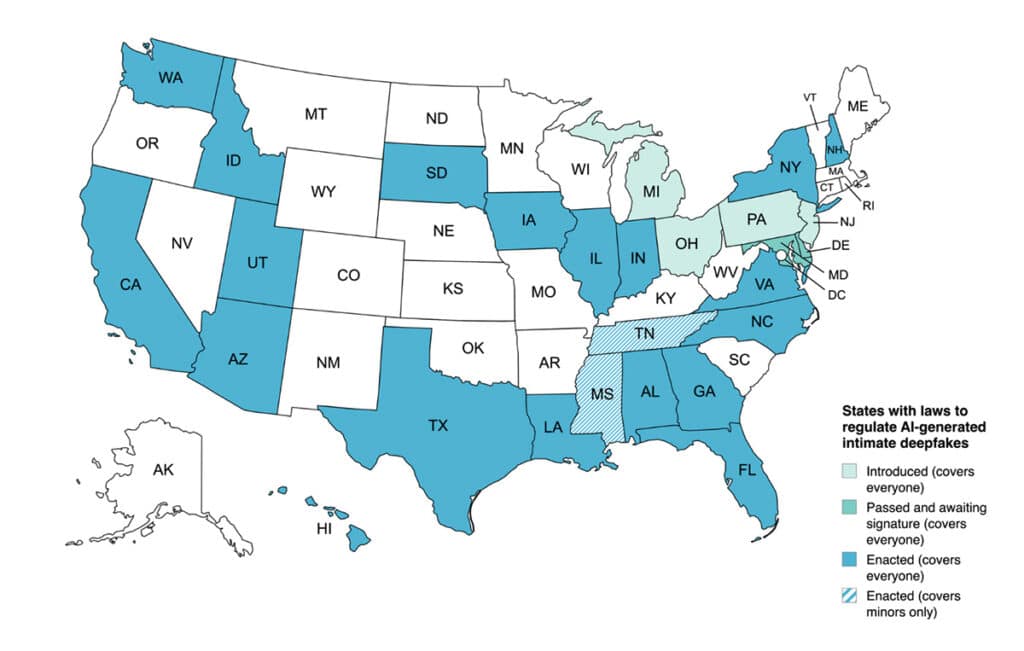Volcanoes are erupting in The Philippines, but on-fire Australia received some welcome rain. The Iran war cries have been called off and The Donald’s military powers are about to be hamstrung by the Senate. Meanwhile, his impeachment trial is starting, and we’re all on Twitter for a front-row seat.
What Could Go Right? Swift Action Against Deepfakes
Countries and states are starting to fight fake porn with legislation.
This is our weekly newsletter, What Could Go Right? Sign up here to receive it in your inbox every Thursday at 5am ET. You can read past issues here.
Swift Action Against Deepfakes
In January of this year, fake pornographic images of Taylor Swift, created with artificial intelligence (AI), began circulating on X, formerly Twitter. While some images were taken down, there were so many that eventually the platform simply made searching for the singer’s name impossible until the issue was fully dealt with. At the time, USA Today ran the headline “Were Taylor Swift explicit AI photos illegal?” and found that they were in only 10 states. (California and Virginia were among the first states to criminalize them, in 2019.)

Deepfake pornography can be created of anybody, by anybody. All you need to do is drop a photo of someone’s face into one of several apps that exist for the purpose. There are even how-to guides on Reddit. The damage it wreaks can be extensive. One Indian journalist ended up at the hospital after a deepfake porn video of her was shared widely online, and her phone number leaked. She was inundated with messages asking for her rates for sex, she wrote in HuffPost.
One of the most popular singers in the world becoming a victim of deepfake pornography was probably the best thing that could have happened to bring attention to a neglected issue, however. It wasn’t only Swift’s fans who jumped to her defense (“protect Taylor Swift” was a trending term at the time). A flurry of state legislative action followed. In Missouri, a lawmaker in St. Charles even named his bill to allow victims of nonconsensual, sexually explicit deepfakes to seek damages in civil court the “Taylor Swift Act.”
That bill, and a second similar one, failed to pass in Missouri. But several others around the country did pass. According to the newly released tracker from the progressive think tank Public Citizen, legislation to regulate what are also called intimate deepfakes now exists in 23 states, and has been introduced in 4 more.

The laws, however, are a hodgepodge. In Mississippi and Tennessee, for instance, the legislation only pertains to minors, and states vary in whether they allow civil or criminal suits to be brought, or both. What is really needed is national coverage, since authorities in, say, Virginia, cannot do much to prosecute someone who lives in any of the states where the creation of intimate deepfakes is still legal.
“States don’t really have a lot of ability to track down across state lines,” Sara Jodka, an attorney who practices data privacy and cybersecurity law, told Wired. “So it’s going to be very rare, and it’s going to be very specific scenarios where the laws are going to be able to even be enforced.”
Two bills have been introduced at the federal level this year: one by Democratic congresswoman Alexandria Ocasio-Cortez, and another by Republican Senator Ted Cruz. Both are bipartisan. Ocasio-Cortez’s Defiance Act would grant victims the right to sue in civil court, and Cruz’s Take It Down Act would require social media sites to take down nonconsensual deepfake pornography and make publishing it a federal crime.
Movement around this issue is just getting started globally as well. As of April, creating a sexually explicit deepfake is a criminal offense in England and Wales. In August, Australia introduced new criminal penalties for the distribution of sexually explicit deepfakes, and made their creation an aggravated offense. Distribution has been illegal in South Korea since 2020. (The nation is currently embroiled in scandal after several chatrooms, run by teenagers, on the messenger app Telegram were found to be sharing intimate deepfakes of students and teachers at their schools.) The European Union, too, has taken steps to criminalize deepfake pornography, although the bill won’t take effect until 2027.
Legislation around legal action is just one piece of the puzzle. Social media companies should also have more robust systems in place to limit the distribution of nonconsensual videos and photos.
It took some time for nations to even start to catch up with the new harms AI can produce—the story of the Indian journalist, for example, happened in 2018. Perhaps in part because politicians, too, are now being affected by deepfakes of themselves, they are finally moving on the topic with more gusto. So far, both domestically and abroad, regulating intimate deepfakes has cut through the usual left-right divisions. Italy’s right-wing prime minister, Giorgia Meloni, introduced comprehensive AI legislation in April that would criminalize harmful deepfakes of all kinds.
What Could Go Right? S6 E20

Is fundamental change possible in a polarized two-party system? Zachary and Emma speak with Forward Party Founder Andrew Yang to discuss the current state of the primary system in the United States and what positive change might look like. They talk about what ranked choice voting is, some key benefits of that system, and the hurdles it faces. They discuss the likelihood of achieving popular but challenging reforms like term limits and stock trading in Congress. The conversation also touches on the dysfunction within the current political system, the incentives that reinforce that dysfunction, and the need to reconfigure the system to reward doing the right thing so that good public servants keep their jobs. | Listen now
By the Numbers
7 in 10: The share of likely voters who think that America’s best days are yet to come, according to a new poll from Quinnipiac University.
4.2M: The decrease in the annual number of child deaths worldwide related to malnutrition between 1990 and 2021.
90: The percent drop in the number of animals used for cosmetic testing in the US since the 1980s. (Progress in animal testing is imperfect, however.)
Quick Hits
📱 Countries across Europe are testing what it’s like to ban smartphones in schools. One of the first to do it in the Netherlands has found that the results are undoubtedly positive.
⚖️ Americans are moving to agreement on many criminal justice reforms, writes a professor that tracks their progress, and are developing less punitive attitudes generally. Several states have passed laws that provide alternatives to incarceration for veterans, prohibit racial profiling, and extend parole eligibility, among other things. (The Atlantic $)
🎭 The New Zealand Opera has become a pioneer for accessibility, becoming the first to introduce Braille surtitling—translations of a performance’s audio—which appear on an audience member’s personal device. And there are signs, at least at this year’s Paralympics, that adaptive fashion—fashion that takes the needs of disabled people into account—is a growing concern for designers.
🏳️🌈 In a 2023 court case, India’s Supreme Court declined granting legal recognition of same-sex marriages, saying that it was a matter for Parliament, but issued a number of recommendations around legal entitlements. Now, India’s government has followed up on one of them, advising banks in the country that queer couples are allowed to open a joint bank account and can list their partner as the recipient of funds in the case of their death.
👩 Poland has re-legalized abortions, allowing them if recommended by a specialist doctor such as a cardiologist or psychiatrist. The country’s previous government had limited their legality to only in cases of sexual abuse or extreme danger to the woman’s health, leading to several deaths as doctors feared imprisonment.
🦠 New medical technology uses a fluorescent light to “light up” bacteria in a wound, so that a doctor can see infection in real-time. Usually, a sample of the wound must be sent to a lab to test for bacteria not visible to the naked eye.
🐁 A common food dye—it’s found in Doritos—mixed with water can make the skin of a mouse temporarily transparent, so that scientists can see the organs underneath. “The breakthrough could revolutionize biomedical research,” reports CNN. The mixture is harmless and washes off.
😮💨 The number of US youth who vape in 2024, at 1.63 million, has dropped significantly. It is approximately one-third of what it was at its peak in 2019.
🏭 The world’s first coal-fired power plant opened in London in 1882. Now, the United Kingdom is closing its last coal plant this month. The country now relies on a mix of gas, renewables, nuclear, and bioenergy for its electricity.
🚀 SpaceX’s Polaris Dawn mission is set to conduct the first private spacewalk today, after traveling the farthest in space humans have gone since the last US Apollo mission in 1972.
👀 What we’re watching: Is a software company’s algorithms the real reason why rents are so high? A Department of Justice lawsuit against RealPage, which collates rent data nationwide, may yield big changes for companies that use price fixing algorithms.
💡 Editor’s pick: There are threats to democracy around the world, but AI is not a significant one: three researchers explain why AI-based efforts to influence elections have not been fruitful.
TPN Member Originals
(Who are our Members? Get to know them.)
- How to be manifestly happier | The Atlantic ($) | Arthur C. Brooks
- The junkification of American life | NYT ($) | David Brooks
- ‘I’m mad as hell . . .’ | The Edgy Optimist | Zachary Karabell
- Harris wins debate | GZERO Media | Ian Bremmer
- Yes, you should vote | Tangle | Isaac Saul
- A failing grade for the electoral college | WaPo ($) | Theodore R. Johnson
- No one older than 75 should be president | The Atlantic ($) | Ezekiel J. Emanuel
- ASL interpreters would make the Harris-Trump debate better | WaPo ($) | Bina Venkataraman
- What if I’m the ‘friend’ Donald Trump referred to? | NYT ($) | John McWhorter
- Is Trump a peacenik? | Nonzero | Robert Wright
- How Netanyahu is trying to save himself, elect Trump, and defeat Harris | NYT ($) | Thomas L. Friedman
- HBCUs at a crossroads: Addressing the decline in black male enrollment | AIBM | Richard V. Reeves
- Bring more smart people to America! | Faster, Please! | James Pethokoukis
- A simple swap to boost growth and improve national security | Slow Boring | Matthew Yglesias


